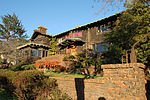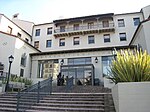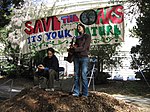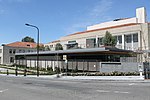Lothlorien (co-op)
Lothlorien (Also known as "Loth") is a cooperative house consisting of two former mansions built next to the University of California, Berkeley, United States. It is located on 2405 and 2415 Prospect Street. Along with Kingman Hall, Casa Zimbabwa and Cloyne Court Hotel it is one of the well known houses in the Berkeley Student Cooperative system. Both buildings are considered to be significant for their architecture and location. The North House was built in the 19th century for American attorney and one of the initial water rights advocates in the United States George Hebard Maxwell. Beginning in 1910s both mansions were converted into group homes, hosting multiple fraternity and sorority organizations. In the early 1970s both became home to the One World Family Commune cult that practiced a New Age, UFO centered religion. In 1975 the complex was sold to Berkeley Student Cooperative to become Lothlorien the vegetarian themed house. Lothlorien has retained some principles of the previous residents - a communal culture that emphasizes vegetarianism and artistic creativity and rejecting individualism and conservative social norms. It is known for progressive activism and is considered to be one of the flagships of the organization. In 1984, events involving Lothlorien residents made national news. Roberta 'Bibi' Lee, a former member disappeared while jogging in Oakland hills with two Lothlorien members, one of whom was her boyfriend; during the co-op organized search effort over 2,000 people volunteered and over 3 million leaflets were distributed along the west coast of the United States. Her body was found five weeks later, leading to her boyfriend being charged with murder. He was acquitted, but found guilty of manslaughter.
Excerpt from the Wikipedia article Lothlorien (co-op) (License: CC BY-SA 3.0, Authors).Lothlorien (co-op)
Prospect Street, Berkeley
Geographical coordinates (GPS) Address Nearby Places Show on map
Geographical coordinates (GPS)
| Latitude | Longitude |
|---|---|
| N 37.867777777778 ° | E -122.24944444444 ° |
Address
Lothlorien North House
Prospect Street 2405
94720 Berkeley
California, United States
Open on Google Maps










